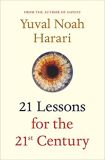21 Lessons for the 21st Century by Yuval Noah Harari
| 21 Lessons for the 21st Century by Yuval Noah Harari | |
|
| |
| Category: Politics and Society | |
| Reviewer: Sue Magee | |
| Summary: Following on from Sapiens which told our history and Homo Deus which looked to the future, 21 Lessons explores the challenges which we now face. enlightening and - occasionally - just a bit frightening. | |
| Buy? Yes | Borrow? Yes |
| Pages: 368 | Date: August 2018 |
| Publisher: Jonathan Cape | |
| External links: Author's website | |
| ISBN: 978-1787330672 | |
|
| |
Yuval Noah HarariIf gave us Sapiens, which told the history of mankind and then Homo Deus which looked at mankind's future. Now we have 21 Lessons for the 21st Century which looks at the challenges we currently face and it's enlightening, thought-provoking and occasionally just a little bit frightening. It's unlikely that mankind will face what - eighty years ago - would have been thought of as a traditional war, with armies, navies and air forces fighting it out hand to hand. It's much more likely that the threats we'll face will be relatively new. Harari looks at them in some depth.
Rather than waging war it's far more likely that the threat will come in the form of a cyberattack. We've seen examples of this already, but a large scale, coordinated cyber attack could be far more effective than traditional warfare and it leaves infrastructure unharmed. It could be the weapon of choice of governments or the terrorist.
I'm not going to go through each of the lessons - you'd be far better off reading the book than my interpretation of it - but there were some points which knocked me for six. Firstly, people worry about immigration: immigrants are going to take our jobs. Political campaigns are fought on the rights and wrongs of immigration, but with the increased ability of computers to perform tasks which have been done by humans, it's likely that it's not going to be an immigrant who takes your job, but an algorithm - and that's not something which any political candidate seems to consider, not least because the implications are just too complicated. Harari believes that in the long run, no job will remain absolutely safe from automation, but opportunities will arise in other sectors, particularly servicing Artificial Intelligence. Retraining will become important and perhaps necessary several times in a working life, creating more jobs in the education sector.
The collection of data online has been in the news a great deal recently: I doubt that many people were aware of the extent to which use could be made of information which we unwittingly (or even carelessly) supplied on sites which we had thought to be benign. The situation only begins to come into context when you realise that we are not those sites' customers but rather their product.
Governments are not as averse as some might expect to external crises: when the media concentrates on them it relieves the pressure on governments to do something about expensive problems such as healthcare or pollution. One of the major problems which we all face is global warming and what Harari has to say about this is thought provoking and decidedly frightening.
I've touched - very briefly - on just a few of the questions which Harari raises. He considers all aspects of twenty-first-century life in considerable detail. I found it a slow read, not because it was difficult to understand (in fact I was constantly surprised at the manner in which he could explain quite complicated concepts and make them easy to understand) but because I kept rereading sections or reading them out to others. I developed a degree of certainly on some questions but there were areas where I'd previously been certain of my views but now realise that I don't have the full picture and more thought will be required.
I'd like to thank the publishers for sending a copy of the book to the Bookbag.
If this book appeals you might also appreciate Us vs Them: The Failure of Globalism by Ian Bremmer.
![]() You could get a free audio download of 21 Lessons for the 21st Century by Yuval Noah Harari with a 30-day Audible free trial at Amazon.co.uk.
You could get a free audio download of 21 Lessons for the 21st Century by Yuval Noah Harari with a 30-day Audible free trial at Amazon.co.uk.
Please share on: ![]() Facebook,
Facebook, ![]() Twitter and
Twitter and
![]() Instagram
Instagram
![]() You can read more book reviews or buy 21 Lessons for the 21st Century by Yuval Noah Harari at Amazon.co.uk Amazon currently charges £2.99 for standard delivery for orders under £20, over which delivery is free.
You can read more book reviews or buy 21 Lessons for the 21st Century by Yuval Noah Harari at Amazon.co.uk Amazon currently charges £2.99 for standard delivery for orders under £20, over which delivery is free.
![]() You can read more book reviews or buy 21 Lessons for the 21st Century by Yuval Noah Harari at Amazon.com.
You can read more book reviews or buy 21 Lessons for the 21st Century by Yuval Noah Harari at Amazon.com.
Comments
Like to comment on this review?
Just send us an email and we'll put the best up on the site.


